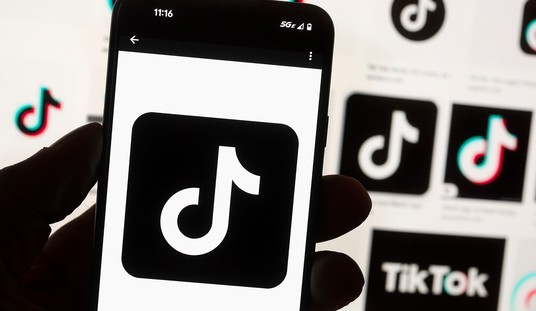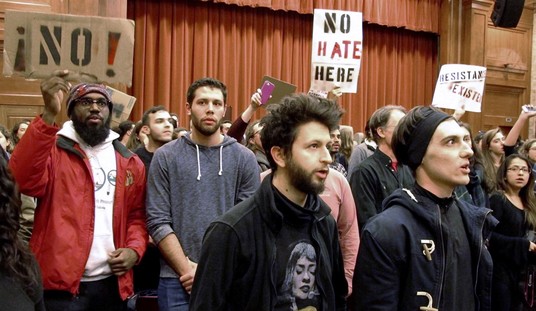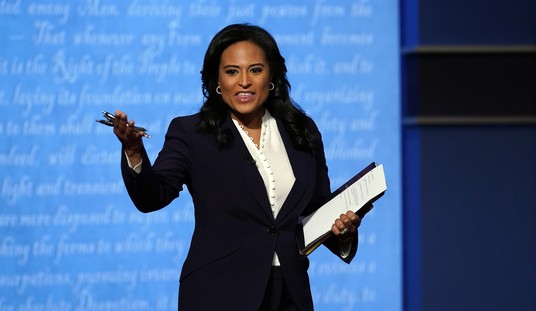How did the decision to fire James Comey get made — and why? The special counsel investigation has made that question a focus, according to a report overnight from ABC News. Robert Mueller’s investigators have submitted “a wide-ranging request” for all communications at the Department of Justice over Comey’s termination, including correspondence with the White House:
Mueller’s investigators are keen to obtain emails related to the firing of FBI Director James Comey and the earlier decision of Attorney General Jeff Sessions to recuse himself from the entire matter, according to a source who has not seen the specific request but was told about it.
Issued within the past month, the directive marks the special counsel’s first records request to the Justice Department, and it means Mueller is now demanding documents from the department overseeing his investigation.
Attorney General Jeff Sessions and Deputy Attorney General Rod Rosenstein played key roles in Comey’s removal. And Sessions has since faced withering criticism from Trump over his recusal and Rosenstein’s subsequent appointment of Mueller.
Mueller’s investigators now seek not only communications between Justice Department officials themselves, but also any communications with White House counterparts, the source said. Before this request, investigators asked former senior Justice Department officials for information from their time at the department, ABC News was told.
The nature of the request makes it look as though the probe will take a hard look at obstruction of justice as a potential charge in the Comey firing. That might be difficult to sustain, however, for two reasons. One, the probe into Russian interference didn’t end with Comey’s firing; instead, the DoJ’s Rod Rosenstein appointed Mueller to conduct it independently. Two, the position of FBI director serves at the pleasure of the president, with a ten-year term a limitation of the director’s authority, not the president’s.
However, “difficult” does not mean impossible, either. This could be just a fishing expedition, and special counsels have wide latitude for such activities, too. It might also be an exercise of due diligence, checking on a thread that critics have raised in order to provide a definitive resolution to it.
There’s still a chance that it might show that the special counsel team wants to pursue an obstruction-of-justice charge, and that would almost by definition be aimed squarely at Donald Trump. He’s the man who ordered the firing, and his shifting explanations for the decision certainly have raised questions over whether he meant to end the probe or seek to influence its outcome. They wouldn’t be seeking this information just to nail Sessions or Rod Rosenstein, the two who sent the formal termination request to Trump. The special counsel demand does include any correspondence about Sessions’ recusal from the Russia-influence investigation, but Rosenstein appointed the special counsel with Sessions’ blessing, which again makes an obstruction charge almost impossible.
In the short run, though, it’s preparation for a new series of interviews with high-ranking White House aides over the next week:
Investigators working for special counsel Robert Mueller are scheduled to interview additional senior White House officials in the coming weeks, adding to their list of high-profile interviews and pushing the investigation closer to President Donald Trump and his family.
On the slate are White House communications director Hope Hicks, White House counsel Don McGahn and Josh Raffel, a communications aide to White House senior adviser Jared Kushner. Other staff are also expected to be interviewed.
These three staffers have spent considerable time around the highest echelon of the Trump administration and campaign. Given their involvement in some key events under scrutiny by the special counsel, Mueller’s interest in talking to them signals continued focus on Trump and the White House.
CNN points out that there are other reasons for investigators to focus on these three aides. Hicks had contact with Manafort, and also routinely provided hard copies of news articles and correspondence to Trump, who does not use a computer. Raffel worked with Jared Kushner and might have info on the meeting with Russians in Trump Tower. McGahn knew Michael Flynn was under investigation before Trump appointed him as national security director, and they’ll want to know what the president knew and when he knew it. He was also in on the discussions about Comey’s firing, though, and apparently present for the decision:
In early May, Trump and Miller, the senior policy aide, had drafted a memo that detailed reasons to fire Comey, but McGahn was concerned about the letter and it was never released, according to The New York Times. Instead, McGahn edited the memo and sent it back to Trump and Miller with revisions. Mueller’s team has a copy of the original draft, the newspaper reported.
After that back-and-forth, McGahn arranged for an Oval Office meeting to discuss the firing with Trump, Attorney General Jeff Sessions and Deputy Attorney General Rod Rosenstein. Sessions and Rosenstein left the meeting with a directive to prepare the legal framework necessary to terminate Comey, according to the Washington Post. Comey was fired the next day.
Just how much McGahn will share might be an issue. As White House Counsel but not Trump’s personal attorney, McGahn can’t claim lawyer-client privilege — but these decisions do fall within the theoretical limits of executive privilege. Executive privilege can’t be claimed to cover up illegal activities, but there’s nothing illegal about a president firing an FBI director or discussing such options with his advisers. Trump would have to make that claim directly, though, and thus far he hasn’t, perhaps in part because it always looks dodgy when presidents make such claims.
Trump’s personal attorney Ty Cobb told CNN that they expect this to be the last round of White House interviews by the special counsel. If so, then perhaps the purpose is merely due diligence after all, but don’t place bets on that outcome yet.








Join the conversation as a VIP Member